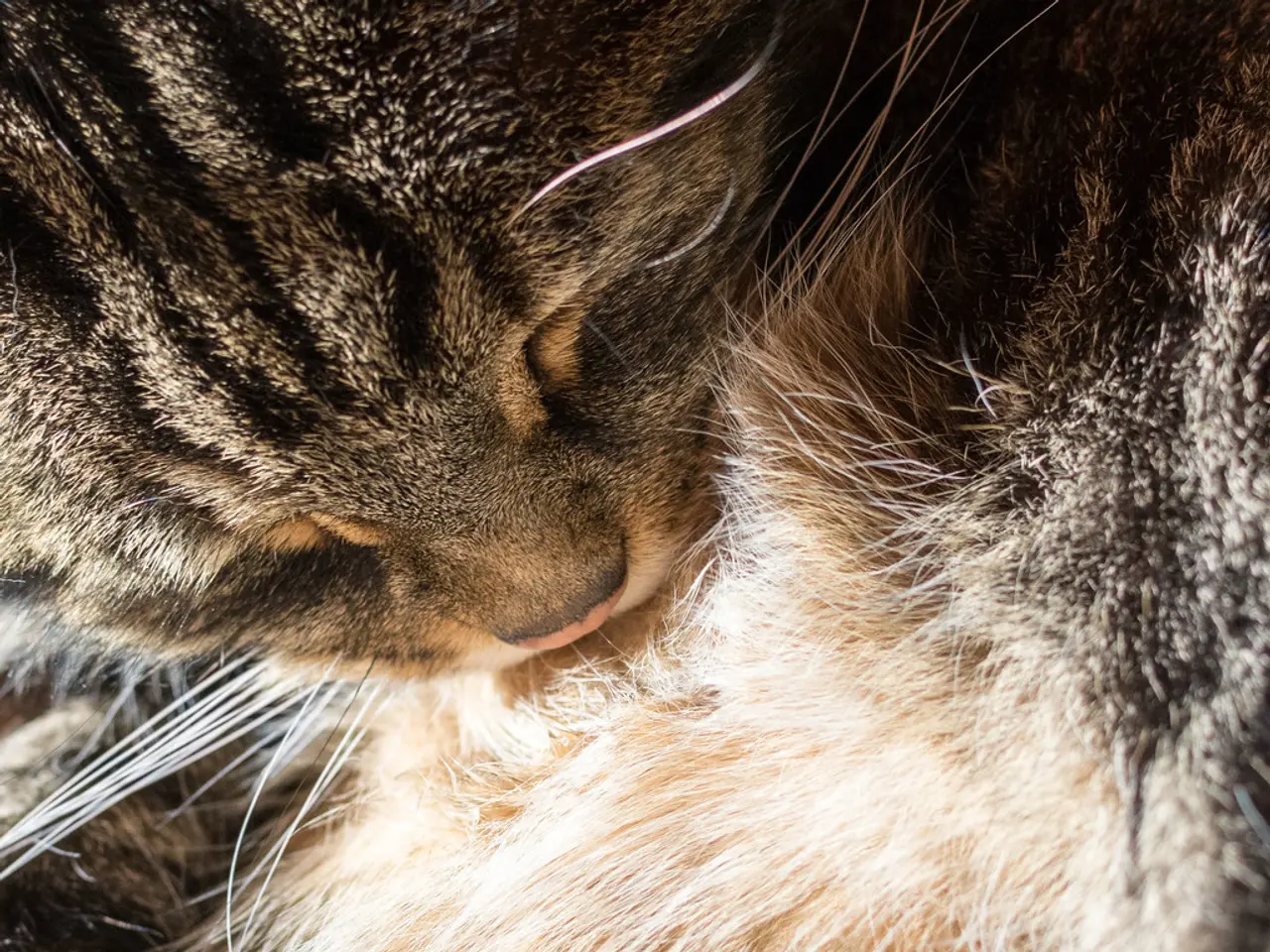Feline Gingivitis: An Uncomfortable and Advancing Early Stage of Dental Disorder in Cats
In the feline world, just like in humans, oral health is crucial for overall well-being. One common dental issue that cat owners should be aware of is gingivitis, an inflammatory condition affecting a cat's gums, often caused by a build-up of plaque on the surface of their teeth. If left untreated, it can lead to serious complications such as periodontal disease, tooth loss, and even systemic infections.
Preventing and treating gingivitis at home involves a combination of regular care and the use of dental products. Here's how you can help manage the condition in your cat.
## Preventing Gingivitis
1. **Daily Tooth Brushing**: Using a cat-specific toothbrush or finger brush, gently brush your cat's teeth with toothpaste designed for cats. This helps remove plaque and keeps their mouth healthy.
2. **Dental Treats and Diets**: Feeding your cat dental treats or a dental diet that has been approved by the Veterinary Oral Health Council (VOHC) can help reduce plaque and tartar.
3. **Dental Toys and Sprays**: Dental toys and chews can help clean teeth as your cat plays, while dental sprays can help reduce plaque. However, they should not replace brushing.
4. **Water Additives**: Adding dental water additives to your cat's drinking water can also help reduce plaque.
## Treating Gingivitis
While mild cases can be managed at home, once tartar forms or if the condition worsens, professional veterinary care is necessary. For severe cases, the vet may recommend a professional dental cleaning, tooth extraction, or medical treatment with anti-inflammatory or antibiotic medication.
Regular veterinary check-ups are crucial for monitoring progress and adjusting treatment plans as needed. In the early stages, gingivitis may cause redness, swelling, and bleeding around the teeth. If not regularly removed, plaque hardens into tartar, which further irritates the gums and worsens the inflammation.
Cats may exhibit signs such as red, swollen gums, bleeding gums, bad breath, drooling, difficulty eating, pawing at the mouth, changes in behavior, and decreased appetite or weight loss. If you notice any of these signs, it's important to consult a vet.
In conclusion, maintaining your cat's dental hygiene is essential for their overall health. Regular dental checks, combined with daily tooth brushing, dental products, and a healthy diet, can help catch issues before they become serious and ensure your feline friend maintains a healthy, happy smile.
- Avoiding Kitten-Sour Food: Feeding your kitten commercial pet food often low in essential nutrients can lead to dental issues and other health problems in the future.
- Vaccination: Regularly vaccinating your pet cat against harmful diseases is a significant part of their overall care.
- Mental and Emotional Health: A cat's behavior is closely linked to its mental and emotional well-being, so providing stimulating toys, environments, and socialization opportunities can help ensure a balanced emotional state.
- Skincare: Skin conditions can be caused by various factors, including hormonal imbalances, allergies, and parasites, so it's essential to monitor your cat's skin health and seek veterinary advice as needed.
- Chronic Diseases: Some cats may develop chronic diseases like cancer, respiratory conditions, digestive health issues, eye-health problems, hearing loss, or neurological disorders. Early detection and appropriate therapies and treatments, such as CBD oil (in some cases), can significantly improve their quality of life.
- Fitness and Exercise: Regular exercise is crucial for a cat's overall health, promoting fitness, maintaining a healthy weight, and supporting cardiovascular health.
- Autoimmune Disorders: Cats may suffer from autoimmune disorders, which occur when the immune system attacks healthy tissues, potentially leading to various medical conditions.
- Workplace Wellness: Implementing pet-friendly workplace policies can contribute to mental health and work-life balance, as pets are known to reduce stress and promote overall well-being.
- Health and Wellness Science: To stay informed about the latest developments in pet health and wellness, consult peer-reviewed scientific research and resources from reputable organizations.
- Medical Conditions: Regular veterinary exams can help identify and treat various medical conditions, including those that may not display visible symptoms, such as skin conditions and underserved issues like mental health.
- Lifestyle While genetics play a role, factors like diet, exercise, and stress level can significantly impact a cat's overall health and can contribute to the development or exacerbation of chronic diseases like obesity, diabetes, and cancer.
- Therapies and Treatments: Some alternative therapies and treatments, such as acupuncture, chiropractic care, and homeopathic remedies, may be used to complement traditional veterinary care.
- Mental Health: Mental health in cats is often overlooked, but it is just as important as their physical health. Common mental health issues in cats include anxiety, depression, and cognitive dysfunction, which can be managed with various therapies, medications, and lifestyle changes.




